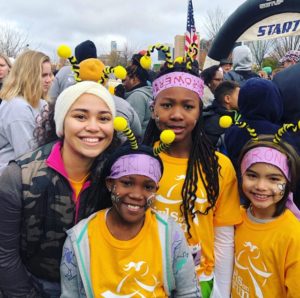For two years before entering medical school, Caroline Fuller taught math to sixth- and seventh-graders at a charter school in Houston, TX. Given that many students started their day with a bag of chips and a sugary energy drink, Fuller didn’t think her young charges were learning about or accessing healthy foods at home, either.
Knowing how healthy meals can impact learning, the experience stuck with Fuller. So when she learned about the Schweitzer Fellowship as a student at the University of Alabama School of Medicine (UABSOM) she saw it as an opportunity to teach young people like her former students about nutrition. An added bonus? “I was also excited about the opportunity to get back in the classroom,” Fuller says.
For her Fellowship project, Fuller is teaching nutrition to students grades 2-9 attending PEER, Inc.’s summer camp at East Lake United Methodist Church in Birmingham. The curriculum, which Fuller designed, teaches young people what nutritious food is and encourages them to make healthier choices. Fuller also hopes that campers will share what they learn with their siblings and friends.
“I hope that my students will take their new recipes and knowledge of sugar intake and healthy food back to their families, creating a larger change in the community,” she says.
Fuller is well aware, however, that getting kids to trade sugary snacks for more healthy fare is a lengthy process. So she measures progress toward that goal in small victories. Recently, for example, during her daily morning walk through the church and down the stairs into the cafeteria where campers eat breakfast, Fuller heard her campers loudly exclaiming, “Hide it, hide it, hide it!” as one of them shoved her table’s Gatorade supply into her backpack and two others tried to hide their Takis and Cheetos by sitting on them.
As Fuller approached them, she was greeted with smiles and laughter. “Hi, Miss Caroline,” they said. “What are we learning about today?”
Fuller, of course, was not fooled. She sees progress in the campers’ attempts at subterfuge, though.
“Lao Tzu states, ‘The key to growth is the introduction of higher dimensions of consciousness into our awareness,’” Fuller points out. “While I wanted to—and did—point out the lack of nutritional value of their snacks, I knew hiding their food was a ‘win.’ My students had become aware that their breakfast choice was not healthy, which I anticipate will lead to growth and change down the road.”
In addition to her faith that her young students will eventually share what they have learned about healthier eating with others, Fuller is hopeful that a future fellow will use the curriculum she created to continue and build upon her program—perhaps someone from the UABSOM East Lake Interest Group—a campus group she founded for the 2017-18 academic year to increase the number of volunteers working in Birmingham’s East Lake neighborhood.
Nutrition isn’t the only subject Fuller feels is missing from school curricula. As a believer that children’s mental health is among the most pressing health care issues right now, she would also like to see mental health education taught in schools, along with more on-site mental health counselors so that young people in need can more easily access care.
Fuller says that the friendships she has made through the Fellowship is one of the best parts of her experience.
“Graduate school tends to be a selfish time, where the focus is growing your own wealth of knowledge,” she says. “The Schweitzer Fellowship gave me an opportunity to not only serve a population, but to be around other students who are also passionate about creating change. It is very motivating to be surrounded by ambitious students who care about other people in this way.”
The opportunity to be associated with a group of people that are passionate about the wellbeing of underserved populations as a Schweitzer Fellow and later as a Fellow for Life is a “huge honor,” Fuller adds. “I believe this holds a lot of responsibility and will encourage me to continue promoting change even after medical school.”


